Eggshells are an amazing byproduct fertilizer for your garden. They are one staple food waste item that should be saved every chance. They contain exceptionally high amounts of calcium and traces of magnesium and selenium.
But, are eggshells good for lemon trees?
Yes, eggshells are especially beneficial to lemon trees as they contain minerals. They are also quite uncommon to naturally form in these plants’ soil.
The minerals mentioned are important for the overall growth of both tree and fruit. Additionally, they are a handy defense against certain forms of disease and improve the pH of your lemon tree’s soil.
Lemon trees thrive best in a pH of between 5.5 – 6.5. Eggshells are great for neutralizing the pH if it starts to sink too low.
You can no doubt purchase mass-produced, artificial fertilizers, but it’s always better to give back what you take from nature, in my view.
Plus, as mentioned, it’s a byproduct, so you could almost call it ‘free.’ Let’s look into how we can use eggshells to improve the yield of a lemon tree.`
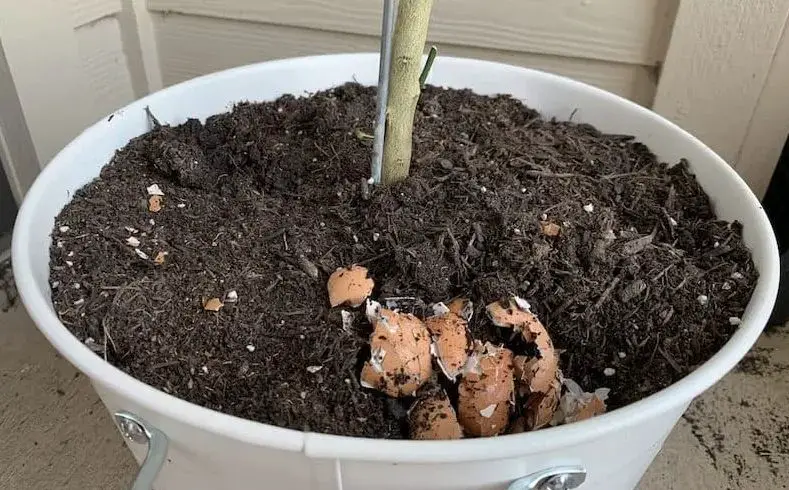
Table of Contents
Are Eggshells Good for Lemon Trees?
Eggshells are an incredible staple waste product for use in your garden when growing lemon trees. They contain highly productive amounts of calcium and traces of magnesium and selenium. These minerals are optimal for all stages of growth, from root to fruit.
They are especially important to assist in the production of healthy and shiny green leaves. Stronger, greener, well-structured leaves produce bigger and better quality fruit. You can add them to your soil as whole shells or crush them fine to improve their effectiveness.
Some gardeners take it one step further and create an extract by boiling to get the most out of every last bit of shell. The latter will allow the natural process to function faster as the soil won’t need to break the shells down first.
Benefits of Using Eggshells for Lemon Trees
Eggshells have many benefits for something you’d usually throw away without a second thought. Before discovering this super hack, I spent a heap of extra unnecessary funds buying fertilizers when I had an abundance of the stuff underneath my nose.
Let’s look at how amazing eggshells are when using them as a fertilizer on your lemon trees.
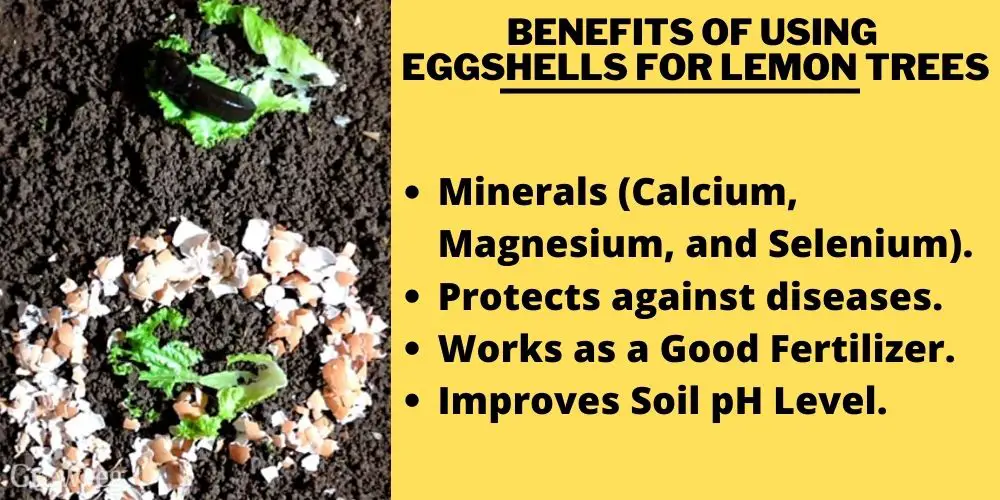
Minerals (Calcium, Magnesium, and Selenium)
The minerals that eggshells contain offer some great natural perks. Calcium assists in the production of strong plant cell walls, which as a result, helps a plant stand up strong. It also helps moisture penetrate the soil, balance the soil chemicals, and reduce salt levels.
Magnesium is the central cog in chlorophyll production. Low or no chlorophyll results in poor or stunted growth. Selenium levels affect the supply of food via the nutrition chain.
These levels must be checked and balanced where possible. Too much can be toxic to plants, humans, and animals. They also pack some important micro and macro elements, including fluorine, iron, silicon, zinc, copper, and manganese.
Protects against diseases
Eggshells are a great mitigation method against common lemon tree diseases such as citrus greening, citrus canker, black spot, and citrus scab. You can add whole or even crush some eggshells fine and add them to the hole in which you plant your lemon tree.
Alternatively, the crushed shells can be added/mixed into the top half inch of the soil surrounding the lemon tree. Eggshells can also help combat slugs and snails as their jagged edges will form a barrier in the soil that can do some damage as they try to wriggle their way through.
Works as a Good Fertilizer
Crushed eggshells act as an amazing slow-release fertilizer. Powdered eggshells can also give lemon trees some fast and impactful fertilization when required. The finer the form, the faster the nutrients reach the roots. Natural nutrient sources are worth their weight in gold!
Improves Soil pH Level
The optimal pH level to grow a lemon tree is between 5.5 and 6.5. Eggshells can neutralize the pH of the soil if necessary. They have a similar effect as using lime. The only difference is that eggshells won’t continually raise the pH level once it reaches the optimal level.
They are a great natural alternative that won’t cause much harm if you accidentally add too much. However, if this is the case, it can be easily corrected.
How To Use Eggshells as Fertilizers for Lemon Trees?
Now that we know the benefits of using eggshells as a fertilizer for your lemon trees, let’s look at how to create one and use it effectively. The first thing that needs to be done is to collect eggshells.
It’s best to collect them raw (unboiled) straight after use and put them aside in a container such as a cardboard box, a glass jar, or a fabric bag. Here are some tips to get you started:
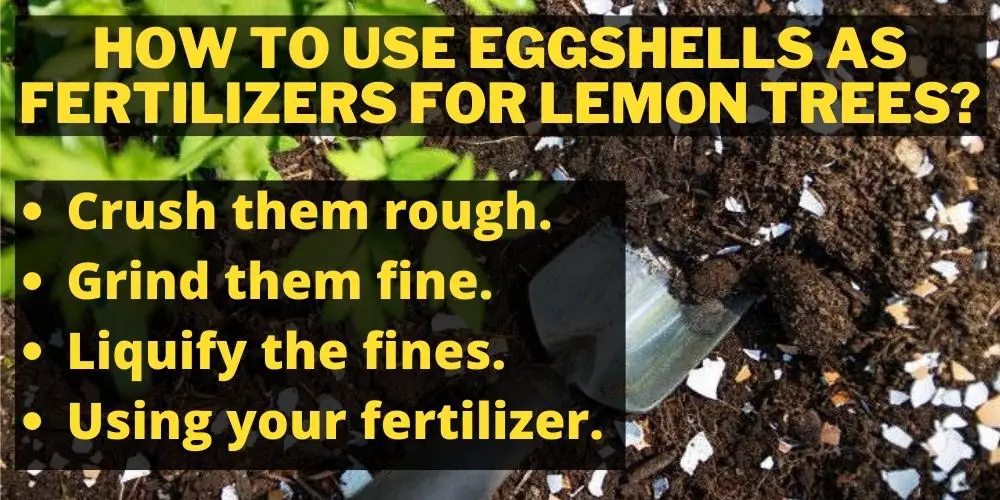
Preparation
Give the eggshells a rinse under warm water to wash away any protein remnants. Even the smallest remaining residue will make them start a rotting process and stink the place out when it comes to fertilizing. So try not to skip this part.
All stench is unavoidable but manageable nonetheless. It is possible to dry them out in the oven. Hand crush them and lay them out evenly on some baking paper. Throw the tray in the oven on low heat (210° F/100°C) for around an hour until dry.
Once you have at least 10-15 eggshells prepped and ready to go, it’s time to start creating some good natural fertilizer. There are a few ways to go about it; you can either:
Crush them rough
This process is as simple as crushing the eggshells in your hands, creating rough ½-inch or so pieces. Add the crushed matter to 1-liter screw lid jars and store for later use. Storing in 1-liter jars will allow you to use the next 2 methods seamlessly.
Grind them fine
Use a coffee or meat grinder to grind down the pre-prepared 1-liter jar of roughly crushed eggshells. You can use a mortar and pestle if you want an even finer powder.
Although this way is more labor intensive, the trouble is worth it! You can use the 2nd jar to separate the stages if you wish. Ground eggshells will work faster as they won’t need to be broken down like rough ones.
Liquify the fines
Lastly, add warm water to the rough crushed or finely ground jars. Leave 1 inch free at the top of the jar, so you have room to shake them around. Shake once daily for 5 days, and your liquid fertilizer will be ready to use. You should notice a slightly off smell, as well, as the water turns cloudy.
Using your fertilizer
Add some solutions to a watering can or spray bottle at a 1:3 ratio (solution: water). Water and or spray as desired. This will give your seedlings and/or plants a welcomed boost of nutrients.
What Happens to Lemon Trees With Excess Eggshells?
Even though eggshells are a completely organic matter, it doesn’t mean you can just go crazy with them when using them as fertilizer. There are a few drawbacks to excess usage, although minor. For example, adding large amounts of calcium for long periods can affect a lemon tree’s ability to uptake other vital nutrients.
These include magnesium, potassium, phosphorus, copper, zinc, iron, and boron. The tree will try to utilize the calcium first, which prevents it from going for the others in a balanced manner. Too much magnesium will funnily prevent the uptake of calcium.
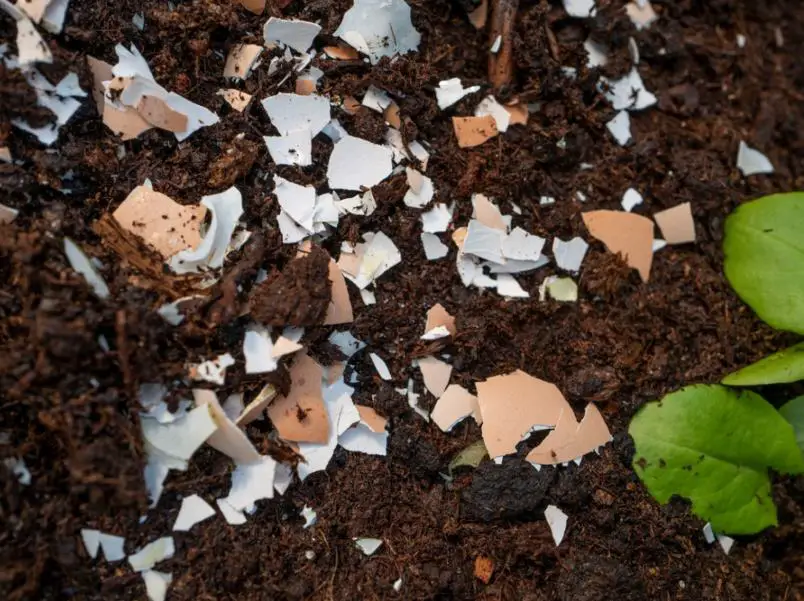
Those 2 minerals almost duel between themselves to claim first and only use. An excess of magnesium will also make the tree show signs of excess salts, including dark-colored vegetation and slowing in growth.
Although the selenium content in eggshells isn’t too great, an excess amount can still cause damage from stunted growth to early death in extreme cases.
How Many Eggshells to Use for Growing a Lemon Tree?
The amount of eggshells required to fertilize and grow a lemon tree is a bit of a tricky question to answer. It depends on how many trees you wish to grow, how large you aim to grow them, and certain soil conditions. For argument’s sake, let’s say you aim to grow one tree and want it to grow as fast as possible. The soil is already at the right pH (5.5-6.5).
If you used 2 X 1-liter jars of the solution mentioned above per growing season, you would need around 40-50 eggs per 1-liter jar. 1 jar for a liquid primer and the other either crushed or ground once the tree trunks start gaining some height.
So doubling would require around 100 eggs saved, cleaned, crushed, or grinded and added to the jars with/without water.
This is just a rough estimate, of course. The eggs could vary in size. The lemon tree may require more or less, so it’s a little trial and error, but 100 eggs is a great starting point.
When to Use Eggshells as Fertilizers for Lemon Trees?
Since eggshells are an organic form of fertilizer, they won’t pack as much punch as store-bought boosters. They still perform well, though, if used in the right amounts and at the right time; in saying that, when you use them, you want to add them sparingly as they take a while to build up a stockpile and create to mix.
It’s best to use the shells, grounds, and liquid gradually.
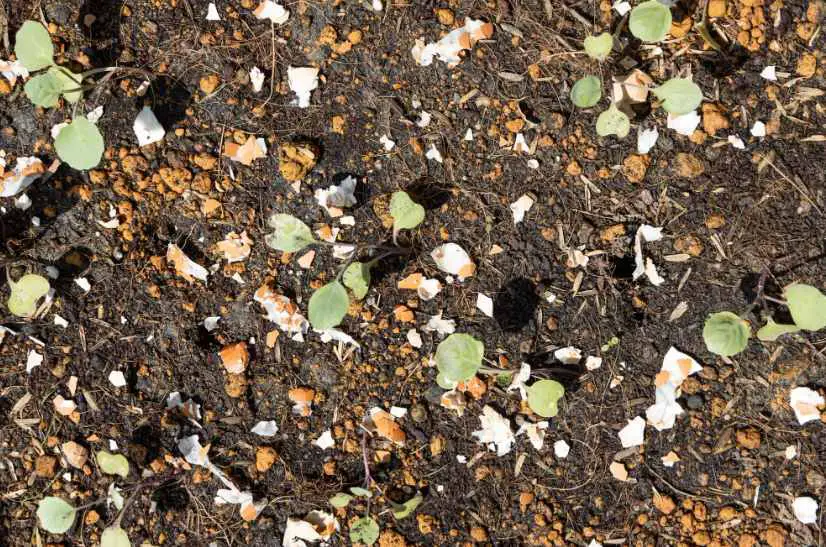
When planting seeds and or seedlings, use the liquid form to spray them as what is known as a ‘primary dressing.’ They don’t need to be soaked but making them moist is optimal. Spray every 2-3 days to kick start the seeds/cuttings.
As the small lemon trees start taking off, you can keep spraying the base with any remaining liquid but also start using some of the crushed or ground shells within the soil mix.
Dig small holes around the base and mix it in gently. Once these lemon trees start growing over 6-8 inches, they don’t need as much of the mixture, but if you have some leftover, add when you get the chance.
Frequently Asked Questions (FAQs)
Do eggshells attract rats?
Yes! Eggshells will attract rats due to the stench of the decaying shells. This problem can worsen if the eggshells are not properly cleaned before storage. The proteins will start to decompose and create a foul smell which the rats love.
Do eggshells keep ants away?
Eggshells keep ants away by throwing their sense of smell out of whack. They don’t enjoy the scent that calcium carbonate gives off. It contains a chalk substance that messes with their scent trails.
Nor do they like the texture of these types of organic matter. The chalkiness irritates them. It’s difficult to use eggshells solely as a deterrent as ants are clever and can walk around them. To stop them, you’d have to lay whole walls of eggshells around whatever you’re protecting.
Are crushed eggshells good for plants?
Yes, crushed eggshells contain vital minerals such as calcium, selenium, and magnesium, which assist in overall plant health and promote solid growth. They are a great natural fertilizer that can be created as a byproduct by an average household staple food source.
Conclusion:
So, are eggshells good for lemon trees? You betcha! Imagine food that almost every household has access to, and instead of trashing the waste, you can use it to help grow a lemon tree. They should teach this stuff at school. Creating this fertilizer is unbelievably quick and simple to make things even more appealing.
We hope that you have enjoyed this article. We highly advise that you give these methods a go and tell us your findings. Happy growing!


